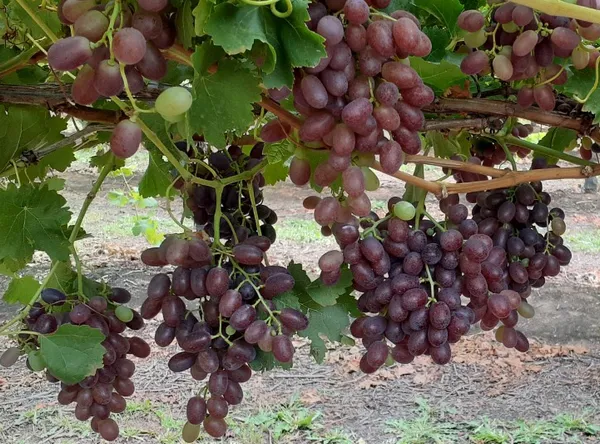A Victorian table grape grower says the recent impacts caused by the outbreak of the COVID-19 Omicron variant have driven up the cost of production across the industry.
Budou Farms Co-owner Enrique Rossi says it is nearly two years since the pandemic began and it is disappointing that primary industries are not seen as important enough to implement targeted measures to keep the costs down for growers and farmers.
"The cost of each item to grow and supply our produce went up," he said. "Omicron has now put us in a desperate situation in regards to workers shortage and shipping issues, some routes with limited options for vessels. Also, if it matches a port with an outbreak in a distribution centre, it means big delays and congestion, at the same time cost of shipping is around 25 per cent up - and other items from 10 per cent to 300 per cent."

Photo: Budou Farms, file
Other COVID-19 related issues that will affect the season, according to Mr Rossi, include that pallets and other logistical equipment are scarce and ordering in advance to try to secure them has been the tactic at the moment.
"It is hard to forecast and plan an export season ahead in regards to workers available to get the job done," he said. "Constant change of rules that makes a huge confusion in how to follow them and different rules among states for the same problem, which in my view is not the logic to tackle the problems, as at the moment looks like an organized mess of rules that partially work or are practical in some scenarios."
Budou Farms, in Merbein Victoria, supplies premium grapes primarily into the Japanese market, with the peak of the season set to start in the coming weeks.
"It is unknown at this stage how markets are in regards to supply and demand, but our market in Japan so far has had a very cold winter which usually means lower consumption," Mr Rossi said. "We expect delays for shipping from here or in arrival there due to the route changes and availability of vessels, however, we do see a good expectation from our customers and consumers to keep demanding our produce once it is there."
Isolation exemption for workers critical to food supply in New South Wales
NSW Health has announced critical workers in the food logistics and manufacturing sectors identified as close contacts will be permitted to leave self-isolation to attend work if they have no symptoms of COVID-19, to ensure the state has continued access to essential goods.
"Workers will only be eligible to leave self-isolation if their employer determines that their absence from the workplace poses a high risk of disruption to the delivery of critical services or activities, and they are unable to work from home," the statement read. "Workers must wear a mask and comply with risk-management strategies put in place by their employer, including daily Rapid Antigen Tests."
The sectors granted the exemption include agriculture (biosecurity and food safety personnel undertaking critical duties), manufacturing (production and manufacturing of food, beverages, groceries, cleaning and sanitary products), and transport, postal and warehousing (food logistics, delivery and grocery fulfilment).
The exemption from the isolation rules for close contacts also applies to emergency services workers who are necessary for the delivery of critical services and who cannot work from home.
It comes as the Victorian Farmers Federation (VFF) says both the Federal and Victorian Governments must fast-track the supply of rapid antigen tests (RAT) and ease isolation requirements for our essential supply chain workforce.
VFF President Emma Germano said the enormous rise of COVID-19 cases in Victoria and the subsequent isolation of an increasing number of workers are mounting pressure on our critical supply chains.
“We’re clearly experiencing a huge escalation in COVID-19 cases throughout the community, meaning a rising amount of people are subject to isolation requirements,” she said. “The less workers there are to maintain our supply chains, the more vulnerable it becomes, and this directly threatens our food security. Farmers can’t provide the food and fibre needed to feed the country without the means to transport it via our essential supply chains. Our access to the inputs needed to operate is also severely impacted. We warned both the Federal and Victorian Governments in October last year of this very scenario and to see this eventuate months later is incredibly frustrating.”
Ms Germano said there needs to be an urgent rethink of quarantine rules and a fast-track of RATs for supply chain workers to ensure capacity.
“To help safeguard our essential supply chains, asymptomatic workers deemed close contacts of COVID-19 cases must have their isolation period reduced, much in the same way as healthcare workers," she added. Workers need to have a reliable access of a RAT and decision-makers must prioritise this. Regional Victoria and our agriculture industry have been a resilient driver of our economy throughout this pandemic and it’s high time that the Victorian Premier Daniel Andrews and the Government listened. Time is ticking, we need action, leadership and guidance now."
Meanwhile, Avocados Australia has reinforced that effective communication along the supply chain is vital in managing the disruptions that arise as a result of COVID-19.
“We encourage all members of the supply chain to engage in effective communication with their stakeholders in order to work through any possible disruptions that might arise due to COVID-19,” Avocados Australia CEO, John Tyas said in the industry's fortnightly newsletter. “From packing through to logistics, and supply to retail outlets, each link in the chain needs to be agile and able to communicate their position/activities to other members along the supply chain. We have been operating in a COVID-19 environment for two years now and businesses need to be able to change the way they operate as situations arise. We know it is a difficult time for everybody so just respond in the best way you can.”
